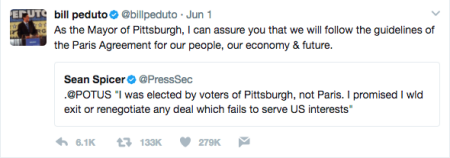Paris Climate Agreement: What's Next?

Last week President Donald Trump announced that the United States would withdraw from the Paris climate agreement.
The agreement, adopted on December 12, 2015, within the United Nations Framework Convention on Climate Change (UNFCCC), aims to strengthen the global response to the threat of climate change and limit temperature increase to no more than 2 degrees Celsius.
So with the United States backing out of the agreement, what happens now?
Cities Remain on the Frontline
Even before the climate agreement, cities have been working to combat climate change by reducing their carbon footprints, which are quite large.
According to a 2016 report by the United Nations, 54.5 percent of the world's population lives in an urban development. In fact, cities account for 70 percent of global greenhouse emissions.

Cities have been executing action plans to reduce the effects of climate change—some of these include creating recycling laws, implementing zero waste goals, and establishing tactics to reduce greenhouse gas emissions. Now, even with the withdrawal, they still remain very active on the frontline.
The benefits of these actions have included more than just lower greenhouse emissions. C40 Cities Climate Leadership Group (C40), a network of major cities working to address climate change, has shown that climate action taken by cities leads to more jobs, cleaner air, and overall better health.
Staying Committed
California Governor Jerry Brown formed the U.S. Climate Alliance, with Washington State, New York, Mexico, and Canada, immediately after President Trump announced he was pulling out of the accord. California, Washington, and New York together make up about a fifth of the U.S. population and account for 11 percent of U.S. emissions.
The U.S. Climate Alliance will allow states to stay committed to the Paris Agreement by creating a forum for its members to further develop and strengthen their existing Climate Action Plans, which will help the United States meet the goal of reducing carbon emissions by 26 to 28 percent by 2025. Since the formation of the alliance, 12 states and Puerto Rico have joined.
Anne Hidalgo, Mayor of Paris and Chair of the C40, in a recent statement, seemed confident that cities around the world would remain faithful to the climate accord.
Indeed, local officials in various U.S. cities have confirmed their city's commitment to following the guidelines and standards set in the Paris agreement.
Bill Peduto, Mayor of Pittsburgh:

Developing Countries Will Suffer
While U.S. cities continue to work toward reducing their carbon footprint, developing countries have been put in a more precarious position.
The impacts of climate change hit developing nations hardest due to their vulnerable geography and limited resources to cope with damage from severe weather events.
When President Trump announced the withdrawal from the Paris Accord, he also said that the United States would cease its contribution to the Green Climate Fund (GCF), citing that it could eventually cost the country "billions and billions and billions" of dollars.
The GCF is a fund established within the United Nations Framework Convention on Climate Change (UNFCCC) to assist developing countries in adaption and mitigation practices to counter climate change. It is intended to support projects, programs, policies, and other activities in developing countries.
In the Paris agreement, wealthy and heavily polluting nations are required to support developing nation counterparts financially and technologically through the GCF, helping them deal with the effects of climate change.
The United States had pledged to contribute $3 billion to the GCF, twice that of the second-largest pledger, Japan. Now that Trump has stopped payments, the United States' contribution will cease at the $1 billion mark.
A loss of this magnitude will devastate developing countries that depend on the programs supported by the GCF to withstand the effects of climate change.
